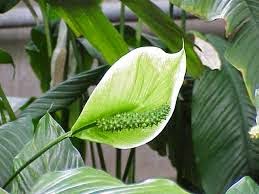About two months ago my daughter arrived downstairs with a house plant. This one had been on a top shelf for a while. Its few yellow straggling leaves were now folded over as if they could no longer face the world. The soil was like a hard ball of dust, very light and had no resemblance to the size or shape of the pot. Dropping off along the route to our compost heap, were spiky bits that were once leaves but now looked a like straw. My daughter knew that this desperate case was just the sort of present that I like. As if to dispel all possible doubt of its suitability as a gift, she announced that it had not flowered for a while!
Once breakfast was cleared away, it was surgery time by the kitchen
sink, removing all the dead leaves and then re-potting. That long soak in a bucket of water must have
seemed a bit excessive to a plant that only had a few leaves left. Having made this initial commitment, it was then given the right kind of light and told very firmly to recover.
Each morning I have a routine of drawing back the curtains and then
looking round my straggly assortment of houseplants to see if
anything's needed. It soon became apparent I have a particularly demanding patient. This did not seem very fair, as if I was being taken advantage of in some way. Whereas in my daughter's care, this plant had clung on in desert conditions, for me it guzzles water, wants feeding on a very regular basis and even the occasional dust! I could
imagine in a real hospital it would be ringing the emergency bell summoning the nurse with a great
sense of urgency whenever a leaf touches the wall. If there's a staffing problem, or some other patient takes priority, it goes yellow and wilts in a flash.
It is not a particularly well-kept secret that some people talk to their plants. In most cases this is positive re-inforcement, encouraging them to grow. With some very naughty demanding plants you have to bite your tongue, even though all the evidence suggests that "someone" does not deserve this second chance, is taking you for a ride, and the human race would be overcome by tryphids if everyone was like you. These straggly relics do not have sweet smelling, colourful flowers and vibrant foliage for visitors to admire. Instead of feeling entitled to discard and replace at will, they are a reminder of how my bedroom window was already crammed full of casualties when I was a child, and that this time-wasting, insidious, rescuing habit can so easily become second nature.
For those afflicted by the rescuing bug, trips to the garden centre are focused on the "DD Section" (short for Dead and Dieing). Here you need to prepare yourself for a crime scene, where there is ignorance, well-intentioned spoiling, the wrong kind of care, bug infestation, neglect or the quite unreasonable fault of now being out of season. Instead of seeing only the dark side of gardening, there is the challenge. Before they even recognised themselves as being trophies, such plants get gathered up lovingly in a very Quakerly way because I like to think there is hope for plants whatever the situation.
As Quakers I do not think we should ignore the "DD section" in our world. Belief in the possibilities does not enable us to be content with wilting leaves that have assumed unnatural colours, disassociation from our roots, and those prickly dry sticks of ministry which have a tendency to drop away. Instead there is the option to draw back the curtains, look honestly at a situation to see what is needs. Since surgery is not an entire solution, we need to show patience, rather than believe our opinion and the manner in which we express it is enough. We can be persistent in the small ways. Each day there is the challenge and the opportunity to use discernment, resolve all forms of drought through immersion in a
bucket of water, and accept that most conflict situation
require cherishing in some way.
This morning my peace lily finally produced a
flower.


No comments:
Post a Comment